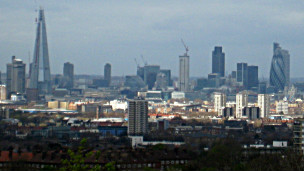Reaching for the sky 城市摩天大楼直冲云端

What will the London skyline look like in ten years?
收听与下载
Vocabulary: buildings楼房
When you're walking around a city, how often do you look up and admire the view? Many of us are in too much of a rush to appreciate the architecture all around us.
Cities are always growing, and when space is at a premium, they expand upwards – reaching for the sky. The skylines of many modern cities are full of skyscrapers: landmarks that can be seen for miles around.
These iconic buildings are often must-see sights for tourists and locals alike. New York has its Empire State Building and the glitzy skyscrapers of Manhattan. Dubai has the world's tallest tower, the Burj Khalifa, which stands at 828 metres; and Shanghai has the world's number two with the completion of the Shanghai Tower. London hasn't always been associated with the race for vertical expansion, but since the opening of Canary Wharf tower in the city's Docklands area, the development of high-rise buildings has been unstoppable.
Now London boasts new skyscrapers with quirky nicknames that reflect the shapes of the buildings - like the Gherkin, the Cheese Grater and the Walkie Talkie. Standing tall amongst them is the Shard – and at 309 metres it's Europe's tallest building.
But they are not loved by everyone. While some prefer them to uninspiring rows of office blocks, others say they obstruct the sightlines of old-fashioned landmarks and that they threaten London's cultural identity. Some say they're just plain ugly!
A group of high-profile Londoners, politicians, artisans and academics are now campaigning to halt certain high-rise developments. Jonathan Glancey, an architecture and design critic and writer, says: "The sad thing is that the quality of the 200 buildings proposed is remarkably low, like weeds in a garden, like Japanese knotweed spreading across the city, and it's something that needs to be stopped."
Of course change and development is inevitable in any growing city. Demand for living, office and retail space is increasing, but why is the only way up? Could London become a city that pioneers building downwards, for example?
What do you think? Should we be building bigger and taller skyscrapers in our cities?
Glossary 词汇表 (点击单词收听发音)
- to admire欣赏
- architecture建筑物
- at a premium(空间因稀少或难得)昂贵,寸土寸金
- skyline(以天空为背景映出的)轮廓
- skyscraper摩天大楼
- landmark地标(建筑)
- iconic标志性的
- must-see 必看的
- vertical expansion(城市)垂直纵向扩展
- quirky奇特的
- gherkin酸黄瓜(伦敦一栋摩天大厦的昵称)
- cheese grater奶酪刨(伦敦一栋摩天大厦的昵称)
- walkie talkie对讲机(伦敦一栋摩天大厦的昵称)
- uninspiring不吸引人的,引不起兴趣的
- sightline(从眼睛到所见物之间的)视线
- cultural identity文化特征、认同
- retail零售